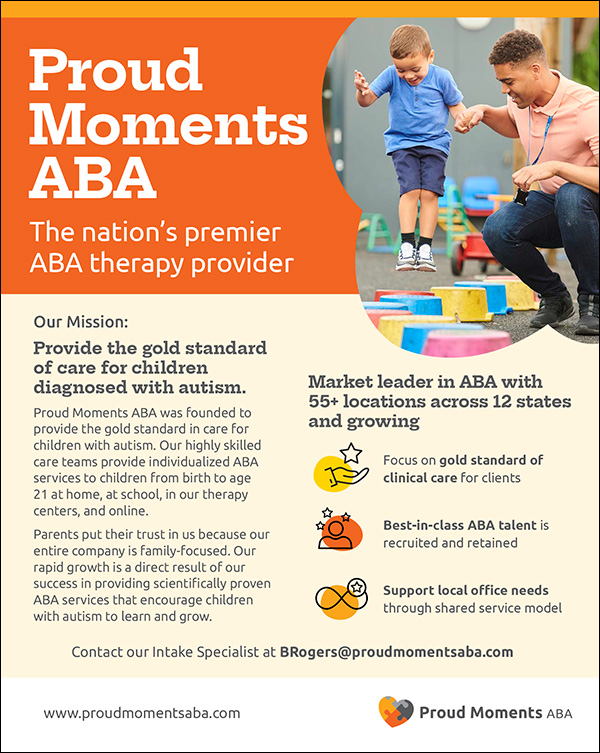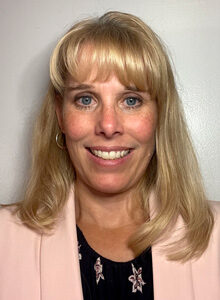Imagine the feeling of expecting a child. You dream for your child, wonder what they will be like, wonder if they will be funny or smart, outgoing, or quiet. You wonder about a lot of things, but you don’t wonder whether they will ever learn to talk. You don’t wonder if they will ever have a job or make friends. Will they eat what they need to, sleep through the night, or toilet themselves without help are not the questions that cross your mind. Until one day they are. Until one day you see an evaluation for your child that refers to him/her as being nonverbal, uninterested in their peers, aggressive, self-injurious, and well below their peers in development. No one wants to see their child struggle. To know that the basic parts of life like talking and making friends will have to be learned through intensive therapy sessions is a reality that will literally steal your breath away as a parent. You can’t help but ask yourself, what does the future look like? Will my child be ok? For me it started a fire under my feet. We needed to get busy, and get busy fast.

Enter Applied Behavior Analysis (ABA). Joey was two years old when we started ABA. Many days I want to go back in time to those days and hug him and hug the younger version of myself who was scared for him. It was intense all right. ABA was a game on approach to teaching Joey all the things he deserved to know. It required a huge commitment on my part to revolve our life around his therapy schedule. I had to learn what his behavior meant and how to respond to it. I had to coordinate team meetings, call therapists with questions, take data, and understand the basics of what the programs were so that I could follow through at home. I was already exhausted and now I had more to be tired about. But we soldiered on. I embraced my role as CEO of his therapy program. I did my best to balance all the moving parts and all the people I loved that were affected by them.
Fast forward time to the present. Joey has language and lots of it. We don’t have long conversations, but I can understand his needs, wants, and even sometimes his wishes for life. He has acquired many new skills that each feel like a giant milestone and none of which are ever taken for granted. He still has meltdowns and there are challenging behaviors we haven’t figured out yet. But it was worth it. All the extra work and all the extra time was worth it.
I know now that this was the best path for us. But I also know that I had to manage it carefully to ensure that we worked on what was most important to Joey. I also needed the support and understanding of our unique family so that what we worked on was realistic for us, gave us the biggest bang for our buck, and incorporated supporting the path Joey chose. It wasn’t about what I wanted for Joey but rather what did Joey want for Joey. I had to keep us all focused on who he was and what was important to him.
Over the years I developed some tools and tricks to accomplish these goals. In my role as an administrator, I have worked with other ABA families. I wanted to get it right for all of us. I learned that being sensitive to each family’s unique culture was critical. Being compassionate was the armor that guards us from judgement of others and criticism of ourselves. I learned some key factors that kept our programs culturally sensitive and compassionate. I learned how to support families who were trying to manage ABA programs and life all at the same time.
Tools and Tricks for the Therapist
- Parents/Caregivers know their child best. Always remember this and acknowledge that they are the experts.
- Acknowledge frequently that this is hard, that they are doing a great job, and that we are a team.
- Use sensitive language – Talk in plain English with terms parents and caregivers already know. Meetings with parents/caregivers should be referred to as collaboration meetings, progress monitoring, and/or behavior skills training meetings. It is not a parent training meeting (I already know how to be a parent).
- Be approachable – Actively listen before responding. Keep any judgments out of your response. Be watchful of your nonverbals.
- Write realistic goals. Change your approach when things aren’t working. If a family is not following through, how can you change the goal so that they will be successful?
- Give options. Ignoring a behavior is just not always possible. Give options so parents/caregivers can be successful.
- Keep parents and caregivers informed. Talk about the progress but be honest about the challenges.
- Work on what matters – What is important to that individual? What is important to that family? What does a typical week look like for that family? Do they value family dinners, eating out, holidays or their faith? Find out what a typical week looks like and ask what they want it to look like.
- Work on the future – What is wanted for the future (school, job, activity)? What do we need to get there?
- What is next on the horizon? – Is there a dentist or doctor’s appointment coming up? Is everyone prepared for it to be successful? How are everyday tasks such as toothbrushing and nail clipping going? Are there any birthday parties coming up? Should we practice for these?
- What are the memory making moments? What are the holidays and occasions that matter to that family? Most of the time when you ask a person what their favorite memories are there is a holiday involved. So don’t forget about these. Prepare for them.
- Support family relationships by including the siblings, cousins, grandparents, and anyone else important to the family.
- Even the best thought out plan is not going to work if it isn’t realistic for the family or staff. Keep what you are asking for families to follow through on realistic.
Tools and Tricks for the Parent, Caregiver, and Sibling
- Trust yourself and remember that no one knows your child better than you.
- Be kind to yourself. Your child is working hard but so are you.
- Make sure your ABA team is approachable. If they are not, try talking to them about what you need and state your needs specifically. If that doesn’t work do not hesitate to ask for a different therapist.
- What are the most important memories you have? If there is a holiday, event, or place that is a part of those best loved memories ask your team to program for those successes for your child.
- Ask yourself what worries you the most. Ask what you want in 1 year, 5 years, 10+ years and then review the goals and decide if what you are working on will get you there. You are the CEO of this program. The goals should fit your lifestyle and the uniqueness of your child.
- Set up regular meetings to discuss the goals and progress of your child. Don’t wait for others to set it up. You aren’t overstepping, you are being a good caregiver.
- Follow through with what you can and be honest with your team when you can’t.
- If something isn’t working speak up about it.
- Go throughout your day and jot down what your struggles are. Sometimes you are so used to day-to-day life that you don’t even realize that everyone breaks out in a sweat when it is time for day-to-day activities like nail clipping and tooth brushing.
- Try to keep school, home, family, and friends all on the same page.
- Remember who you are. What is the uniqueness of your family unit? Do you love sports, games, books, tv? Do you go to movies, restaurants, or camping? These may not feel like big-ticket items such as communication, but they matter. Don’t be afraid to prioritize working on these things too.
It is possible to implement an intensive approach, such as ABA, to teach new skills while remaining compassionate and realistic. Intensive is not the opposite of compassionate. When we are sensitive in our approach, intensive is synonymous with seeing the potential and working towards it. As caregivers we often worry whether we are doing enough. But you have everything you need to be successful. You have love. Love will help you get up when you are tired. Love will help you do more when you have already done so much. Love will help our kids see how much they matter. Love will help us all remember, as caregivers, that we are doing the best we can.
Bobbi Rogers is the parent of three children. Her son Joey is autistic and is the inspiration for everything she does. Bobbi is the founder of NY Families FIRST and the Senior Director of Community and Industry Relations at Proud Moments ABA. She has presented on such topics as Caregiver/Parent Collaboration, Autism Advocacy and ABA nationally and has started multiple programs across NY that support Autistic individuals and their families. She sits on the Board of the New York State Association for Behavior Analysis and is chair of the Parent, Family, and Advocate Committee.






